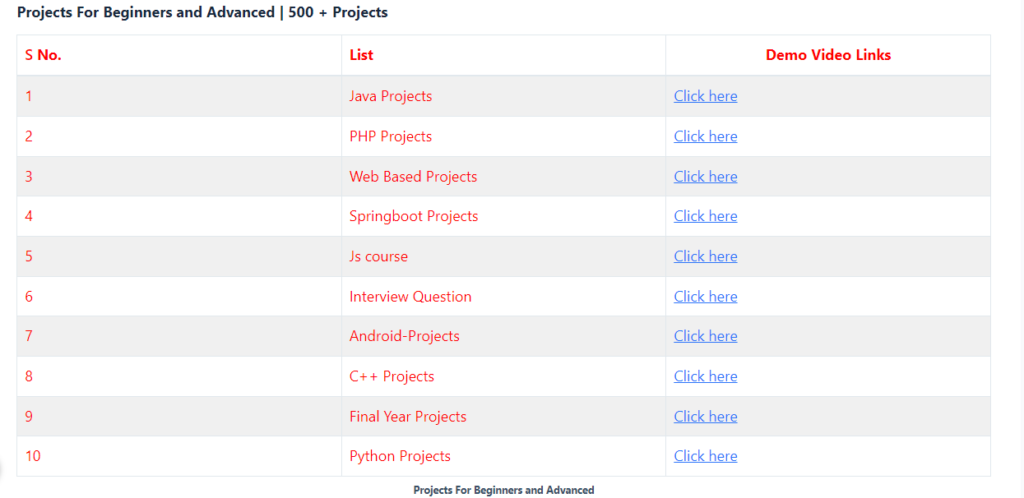Smart Online Court Case Management System
Introduction
In the digital age, the need for efficient and transparent legal systems has never been greater. Traditional court management systems often face challenges such as delayed case assignments, lack of communication, and administrative inefficiencies. To address these issues, we propose a Smart Online Court Case Management System. This project, built using Bootstrap and PHP, will automate the allocation of cases to magistrates and send SMS notifications to both complainants and accused parties, streamlining the entire process.
Making the Project
Creating a comprehensive Court Case Management System involves several steps, from setting up the environment to deploying the final application. Our project will cover user authentication, case registration, automated case allocation, SMS notifications, and case tracking.
Essential Features
- User Authentication: Secure login system for court staff.
- Case Registration: Easy input and storage of case details.
- Automated Case Allocation: Intelligent system to assign cases to magistrates.
- SMS Notifications: Real-time updates to complainants and accused parties.
- Case Tracking: Monitor and update the status of cases.
https://updategadh.com/category/free-projects
Required Software and Tools
- Web Server: XAMPP or WAMP
- Programming Language: PHP
- Database: MySQL
- Front-End Framework: Bootstrap
- SMS API: Twilio or Nexmo
Running the Project
1. Setting Up the Environment
Install XAMPP or WAMP on your local machine to create a development environment with PHP and MySQL.
2. Creating the Database
Create a MySQL database and define the necessary tables for users, cases, and magistrates.
CREATE DATABASE court_management;
USE court_management;
CREATE TABLE users (
id INT AUTO_INCREMENT PRIMARY KEY,
username VARCHAR(50) NOT NULL,
password VARCHAR(255) NOT NULL,
role ENUM('admin', 'staff') NOT NULL
);
CREATE TABLE magistrates (
id INT AUTO_INCREMENT PRIMARY KEY,
name VARCHAR(100) NOT NULL,
available BOOLEAN DEFAULT TRUE
);
CREATE TABLE cases (
id INT AUTO_INCREMENT PRIMARY KEY,
case_number VARCHAR(50) NOT NULL,
complainant_name VARCHAR(100) NOT NULL,
accuser_name VARCHAR(100) NOT NULL,
details TEXT,
magistrate_id INT,
status ENUM('pending', 'in_progress', 'closed') DEFAULT 'pending',
FOREIGN KEY (magistrate_id) REFERENCES magistrates(id)
);
3. Designing the Front-End
Using Bootstrap, create a responsive user interface for the system, including login forms and dashboards.
<!DOCTYPE html>
<html lang="en">
<head>
<meta charset="UTF-8">
<meta name="viewport" content="width=device-width, initial-scale=1.0">
<link rel="stylesheet" href="https://maxcdn.bootstrapcdn.com/bootstrap/4.5.2/css/bootstrap.min.css">
<title>Court Management System</title>
</head>
<body>
<div class="container">
<h1 class="text-center">Court Management System</h1>
<div class="row">
<div class="col-md-6 offset-md-3">
<form method="POST" action="login.php">
<div class="form-group">
<label for="username">Username</label>
<input type="text" class="form-control" id="username" name="username" required>
</div>
<div class="form-group">
<label for="password">Password</label>
<input type="password" class="form-control" id="password" name="password" required>
</div>
<button type="submit" class="btn btn-primary">Login</button>
</form>
</div>
</div>
</div>
</body>
</html>
4. Implementing User Authentication
Develop a PHP script to handle user login and authentication.
<?php
session_start();
include 'db.php'; // Database connection file
if ($_SERVER['REQUEST_METHOD'] == 'POST') {
$username = $_POST['username'];
$password = $_POST['password'];
$stmt = $pdo->prepare("SELECT * FROM users WHERE username = ?");
$stmt->execute([$username]);
$user = $stmt->fetch();
if ($user && password_verify($password, $user['password'])) {
$_SESSION['user_id'] = $user['id'];
$_SESSION['username'] = $user['username'];
$_SESSION['role'] = $user['role'];
header('Location: dashboard.php');
} else {
echo "Invalid credentials!";
}
}
?>
5. Case Registration and Management
Create forms for registering new cases and scripts to handle data storage and management.
<?php
// case_registration.php
if ($_SERVER['REQUEST_METHOD'] == 'POST') {
$case_number = $_POST['case_number'];
$complainant_name = $_POST['complainant_name'];
$accuser_name = $_POST['accuser_name'];
$details = $_POST['details'];
$stmt = $pdo->prepare("INSERT INTO cases (case_number, complainant_name, accuser_name, details) VALUES (?, ?, ?, ?)");
$stmt->execute([$case_number, $complainant_name, $accuser_name, $details]);
// Automated case allocation logic
$magistrate = allocateCase();
if ($magistrate) {
$case_id = $pdo->lastInsertId();
$stmt = $pdo->prepare("UPDATE cases SET magistrate_id = ? WHERE id = ?");
$stmt->execute([$magistrate['id'], $case_id]);
sendSMS($complainant_name, $accuser_name, $case_number);
}
}
?>
6. Automated Case Allocation
Develop a function to automatically assign cases to available magistrates.
<?php
function allocateCase() {
global $pdo;
$stmt = $pdo->query("SELECT * FROM magistrates WHERE available = TRUE LIMIT 1");
$magistrate = $stmt->fetch();
if ($magistrate) {
$stmt = $pdo->prepare("UPDATE magistrates SET available = FALSE WHERE id = ?");
$stmt->execute([$magistrate['id']]);
return $magistrate;
}
return null;
}
?>
7. Sending SMS Notifications
Integrate an SMS API to send notifications to the involved parties.
<?php
function sendSMS($complainant_name, $accuser_name, $case_number) {
// Use an SMS API like Twilio, Nexmo, etc.
$message = "Case $case_number has been registered. Complainant: $complainant_name, Accused: $accuser_name.";
// Example using Twilio
$sid = 'your_twilio_sid';
$token = 'your_twilio_auth_token';
$twilio = new Client($sid, $token);
$twilio->messages->create(
'+1234567890', // Recipient phone number
array(
'from' => '+0987654321', // Your Twilio number
'body' => $message
)
);
}
?>
Project Screenshots

Download Project
Complete Python Course : Click here
Free Notes :- Click here
New Project :-https://www.youtube.com/@Decodeit2
How to setup this Project Complete video – Click here
Conclusion
Building a Smart Online Court Case Management System with Bootstrap and PHP can significantly improve the efficiency and transparency of legal proceedings. By automating case allocations and sending real-time SMS notifications, this system addresses many of the challenges faced by traditional Smart Online Court Case Management System systems. We hope this guide provides you with the necessary steps and insights to develop a similar system tailored to your specific needs.
Tags: #Smart Online Court Case Management System #PHP #Bootstrap #WebDevelopment #CaseManagement #SMSNotifications
SEO Keywords: Smart Online Court Case Management System, Online Court Case Management, Bootstrap PHP Court System, Automated Case Allocation, Legal Case Management Software, SMS Notification System for Courts, Efficient Legal Proceedings, Court Case Management Project
